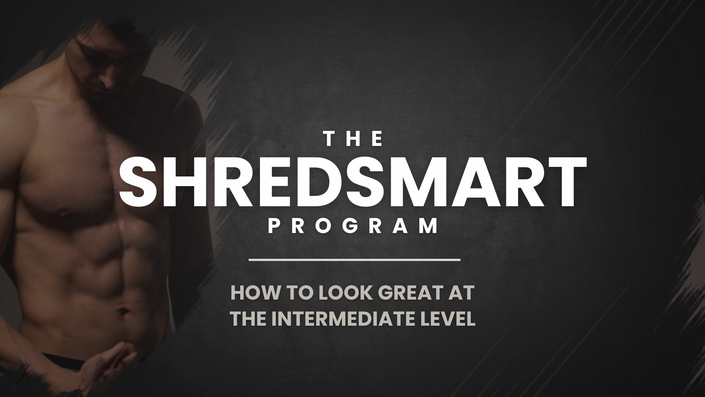
The ShredSmart Program
How to look great at the intermediate level

If you’ve been training for a few years, your physique probably looks similar to mine in this picture: intermediate level of muscle development and around 20% body fat.
That’s already better than 90% of the general population, so congrats on that! But you probably want more. The problem with this physique is that you’re not muscular enough to look big and not lean enough to have muscle definition either. You’re somewhere in between (what I call “no man’s land”). And that’s not a particularly impressive look. I know that if I were to post this picture on Instagram, the trolls would roast me with the classic comment: “Do you even lift?” And their comments would sting a bit because I’d have to admit I really don’t look like I train as much as I do.
Well, if you find yourself in this situation, there are two paths you can take to “look like you lift”:
Path #1 – Bulk up: get to an advanced level of muscle development while trying to stay at around 20% body fat (this is sometimes called “going bear mode”)
Path #2 – Get lean: improve muscle definition by losing some fat and maintaining (or slightly increasing) your muscle mass

Either choice is fine. It all comes down to your preferences and goals.
However, I believe that getting lean is the better choice for the majority of intermediate lifters. In fact, I’d even go so far as saying that getting to a lower body fat percentage is the ONLY way most regular gym-goers can ever look impressive. There are two reasons for this:
- Most lifters cannot or are unwilling to put in the work required to build and maintain muscle beyond the intermediate level.
- Low body fat can make you look amazing even at an intermediate level of muscle development.
The power of low body fat
Whenever Hollywood wants to sell you the idea that a character is strong and can beat up the bad guys, they get the actor very lean (generally below 12% body fat). Why? Because muscle definition creates the illusion of size. An actor at 10% body fat appears to have more muscle than at 20% body fat, even though in reality he is smaller overall. Add in a muscle pump and the right lighting and the difference is like night and day.
All the actors in the pictures below have intermediate muscle development. They may have less muscle mass than you do right now. But the reason they look great is because they’re very lean.
If you get lean as well, you’ll likely look similar to one of these nine actors, depending on how much muscle mass you have.

Jason Statham in The Mechanic (2016)

Brad Pitt in Fury (2014)

Henry Cavill in Immortals (2011)
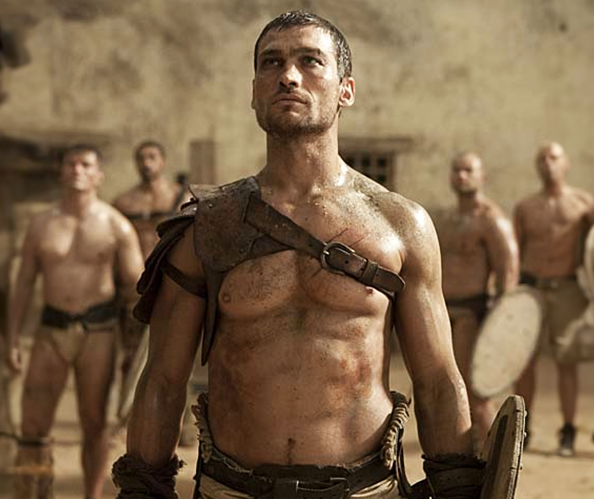
Andy Withfield in Spartacus (2010)
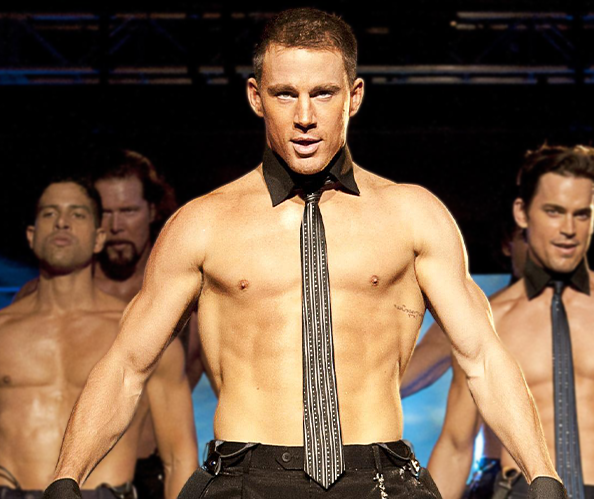
Channing Tatum in Magic Mike (2012)

Daniel Craig in Quantum of Solace (2008)
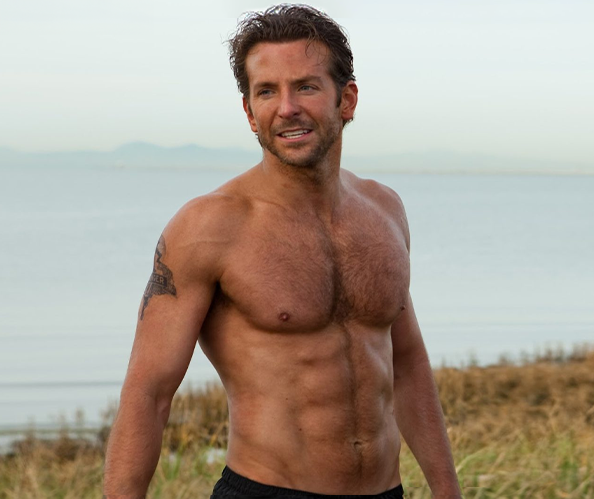
Bradley Cooper in the A-Team (2010)

Jake Gyllenhaal in Southpaw (2015)
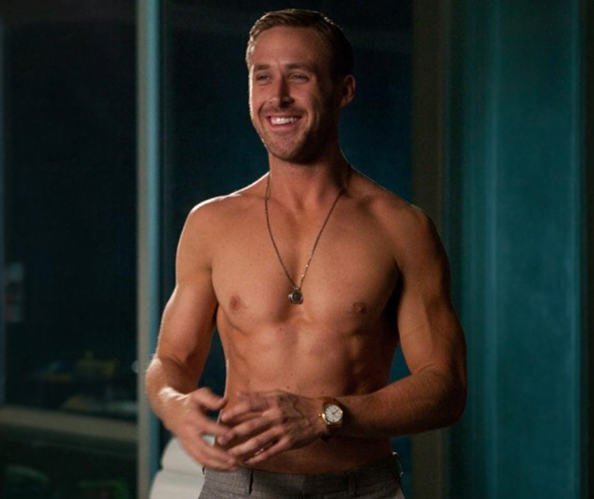
Ryan Gosling in Crazy, Stupid, Love (2011)
For example, the video below shows how I looked when I cut down from around 20% body fat to 13% and then 10%. I tried to keep the same camera settings, angle, and lighting to make the comparison as fair as possible. Notice how when I’m leaner I appear to have more muscle mass. That’s not the case. I was actually smaller but the increased definition creates the illusion of more size. Also worth noting is that my muscles look flatter at 10% compared to 13%. That’s because I was pretty depleted by that point. If I ate more carbs for a few days I would “fill up” and look bigger.
You can achieve a similar transformation.
From my experience, most intermediates are happiest in the 11-13% body fat range. That’s the perfect balance between size, visible abs, muscle definition, strength, and general wellbeing. So I recommend you set that as your goal. The 8-10% range does look better but it comes with a few major downsides: less overall size, strength loss, more hunger, obsession with food, lower energy, lower sex drive, worse mood, and more mental stress. I recommend getting down to the 8-10% range only if you want to do a professional photoshoot: with a muscle pump and the right lighting you can take some truly fabulous pictures. Otherwise, it’s not worth getting that lean – at least not at the intermediate level.
If you’re now at 20% body fat, getting down to around 12% will require losing 5-15 kg of fat (10-35 lbs), depending on how much you weigh. But here’s the thing: most of us tend to significantly underestimate our starting body fat percentage. In my coaching experience, I’ve noticed that intermediate lifters typically reach ~12% body fat when their body weight in kilograms is equal to their height in centimeters minus 105 to 110.
body weight of intermediate lifters at ~12% BF = height in cm – 105 to 110
So for example, if you are 180 cm in height, I would expect you to reach ~12% body fat when you get down to between 70 and 75 kg. This means that if you currently weigh 80 kg and you’re 180 cm in height, you’ll likely need to lose 5 to 10 kg of fat. Obviously, this formula doesn’t work perfectly but it’s pretty accurate.
How ShredSmart will help you get lean
In order to get lean you must maintain a small, daily caloric deficit for as long as it takes to get the fat off.
Simple enough. The problem though lies in the “as long as it takes” part. The maximum sustainable rate of fat loss that doesn’t lead to muscle loss, frequent cheat days, and eating disorders is approximately 1% of your body weight per week. If you weigh 80 kg (175 lbs), that works out to a maximum rate of fat loss of 0.8 kg per week or 1.5 lbs per week. But it’s usually better to cut a bit slower than this – around 0.5 kg / 1 lb per week. So if you need to lose 10 kg (22 lbs) to get lean, that means you have to maintain a caloric deficit for 12-20 weeks.
12-20 weeks of cutting…
This sounds hard, right? How can you possibly stick to a diet for that long? This is where ShredSmart comes in! ShredSmart shows you how to adjust your food choices, meal frequency, food distribution, and food environment to make adherence to the daily calorie and protein targets as easy and enjoyable as possible. When your plan is optimized for adherence, cutting for 12-20 weeks can actually be pretty easy.
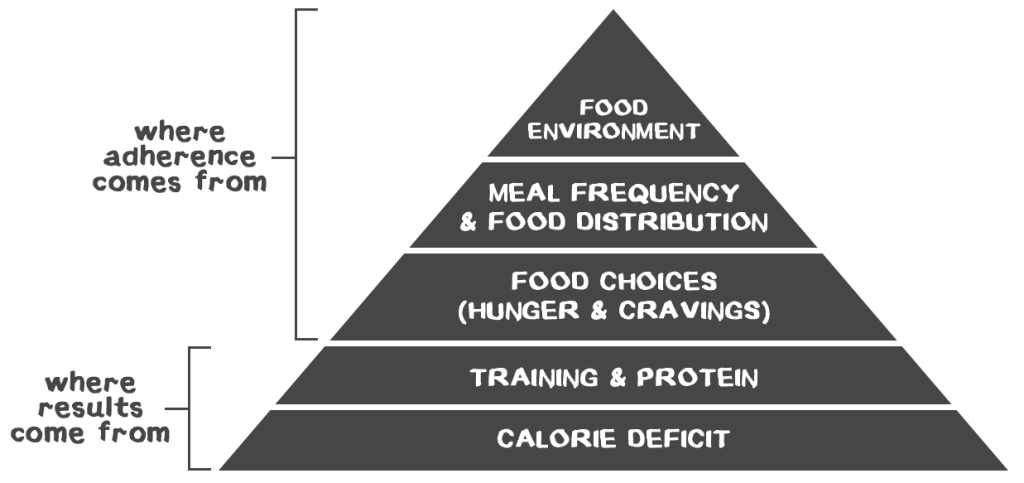
The ShredSmart nutrition plan is designed to accomplish three things:
- Manage hunger
- Satisfy cravings
- Accommodate social eating
Managing hunger is top priority. It’s the make-or-break factor of the plan. What you eat and when you eat have minimal direct impact on fat loss and muscle growth but have a huge influence on how hungry you feel throughout the cut. Even though you could lose fat on a diet of high-calorie foods, snacks, and protein shakes, you would feel hungry all the time and you wouldn’t be able to sustain it for several months. It’s a major mistake to rely on willpower to resist hunger throughout a cut. The key to long-term adherence is to eat in such a way that makes you feel satiated after every meal despite being in a calorie deficit. With the ShredSmart program you’re going to manage hunger by eating mostly low calorie foods and doing intermittent fasting.

As you probably know, there’s a difference between food quantity and calorie content. It is possible to eat tiny amounts of food and still have a high caloric intake and it is possible to eat large amounts of food and still have a low caloric intake. It all depends on the foods you choose. On the ShredSmart program you’ll be eating mostly low-calorie, high-volume foods (the blue part of the spectrum) which will keep you nice and full.
But what about cravings? Could you resist eating your favorite foods and snacks for 3 months? Probably not. Most people that try to stick to boring, restrictive diets end up having cheat days a few times a week in order to satisfy their cravings. This can be a problem because it increases the overall length of the cut. If you’re not in a calorie deficit for two or three days per week, losing 10 kg of fat might take you 6 to 8 months instead of 3 to 5 months. And if you’re someone who loses motivation quickly, this might cause you to abandon the cut halfway through.
The good news is that you don’t need to have a very restrictive diet. On the ShredSmart program you will be able to eat any food you want in moderation while staying in a calorie deficit. The key to making that work is intermittent fasting. Intermittent fasting involves skipping breakfast and saving your calories for two or three large meals in the second part of the day. The higher calorie budget per meal gives you the freedom to include higher calorie foods like burgers, pizza, or desserts. Based on my experience and client testimonials, no other diet structure is as effective at managing hunger and satisfying cravings. Some clients find that they can eat so much and so unrestricted that they don’t even feel like they’re cutting for the first month or two.
Below you can see two examples of ShredSmart diet structures. The program gives you many more templates to choose from depending on when you train, your job schedule, and lifestyle preferences.

And intermittent fasting has another major benefit: it allows you to accommodate social eating. If you’re like most people, you share a meal with your family members at least once a day. You also frequently want to (or need to) attend social gatherings where delicious food and alcoholic drinks are served. This week it may be a birthday dinner, next week it may be a night at the movies, the week after that it may be a wedding or a holiday. These events can easily derail your efforts to maintain a calorie deficit. Even worse, cheat days are often triggered by social eating.
Many people find that they can easily stick to a calorie deficit when they prepare and eat their meals at home but when they’re with friends and family they simply cannot resist eating or drinking more, eliminating the calorie deficit in the process. Depending on how active your social life is, these events can force you to extend the cut by three to six weeks more than planned, which isn’t ideal for maintaining motivation. Intermittent fasting allows you to save most of your calories for the evening, so whenever you eat out, you have something like 1000 calories to play with. You can thus enjoy any type of food and beverage in moderation while not compromising your fat loss results.
How ShredSmart will help you build and maintain muscle
The energy deficit takes care of weight loss but the way you train and your daily protein intake determine what is being lost: fat or muscle. When your goal is to improve muscle definition, your main focus during a cut should not be just weight loss, it should be fat loss with muscle maintenance or growth. The nutrition section of ShredSmart will show you exactly how to set your calorie and protein intake and how to track them with a food scale and nutrition app. This will ensure your body has the fuel and the amino acids it needs to repair and grow muscle tissue.
But the most significant factor in muscle maintenance and growth is training. You need to lift weights in order to maintain or improve your size and strength. ShredSmart provides six training splits for you to choose from, depending on your preferences and time constraints: 4x Full Body, 4x Upper-Lower, 4x Push-Pull-Legs, 4x Leg, Push, Pull, Full Body, 3x Full Body, and 3x Upper, Lower, Upper. The training variables for each routine, including volume, frequency, effort, rest periods, and progression, are set based on the latest research.


What you’ll be doing…
- Calorie and protein tracking with a food scale and app
- 16:8 Intermittent Fasting
- Eating 2-3 meals per day
- Eating mostly low-calorie, high-volume foods
- Eating your favorite foods on a regular basis
- Strength training 3-4 days per week
- Progression model: Wave-loading linear periodization + Multi set double progression
- Walking ~5000 steps per day to burn calories (optional)
Testimonials


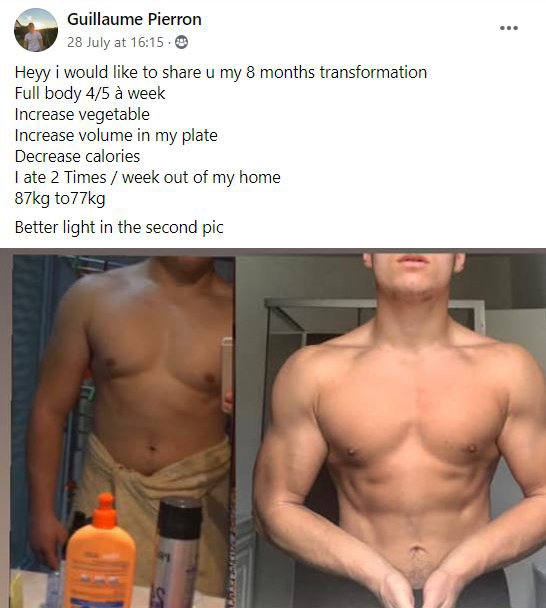
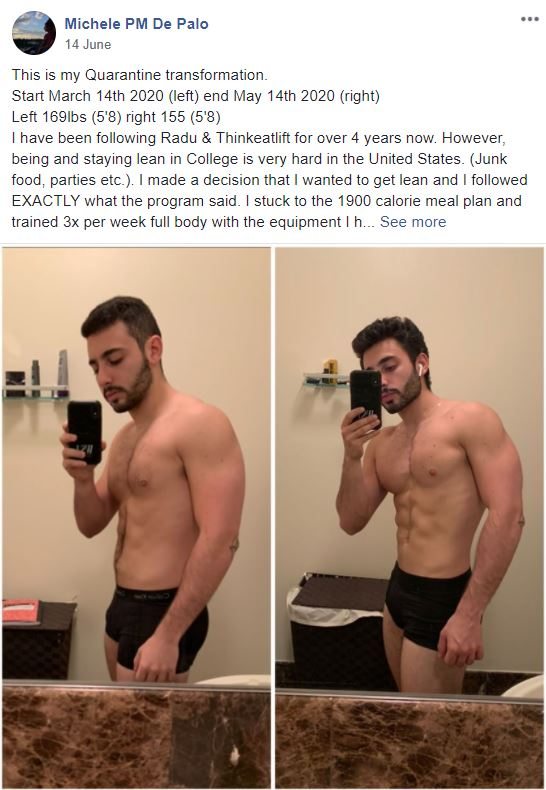
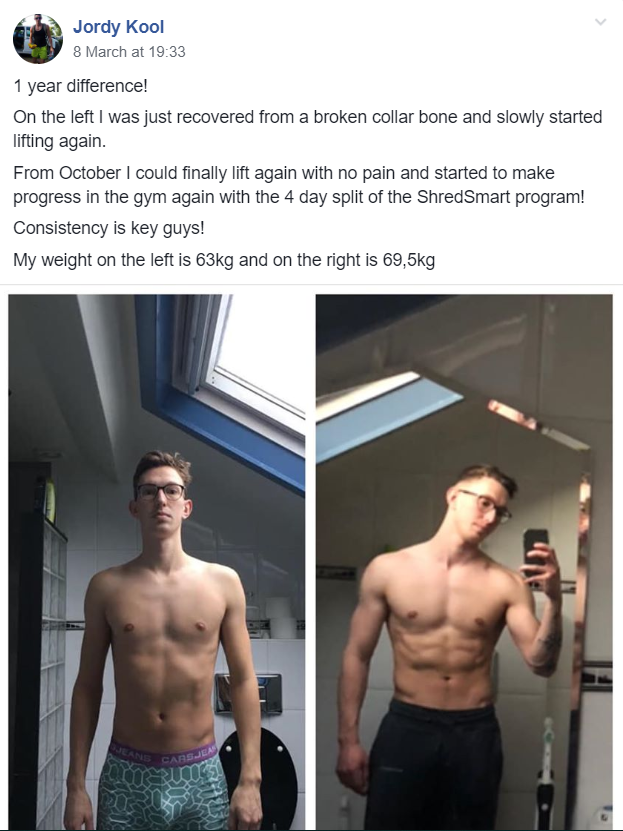
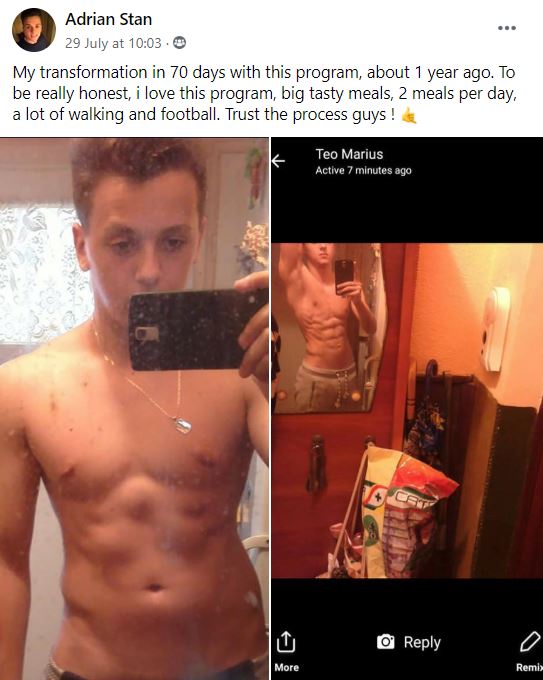
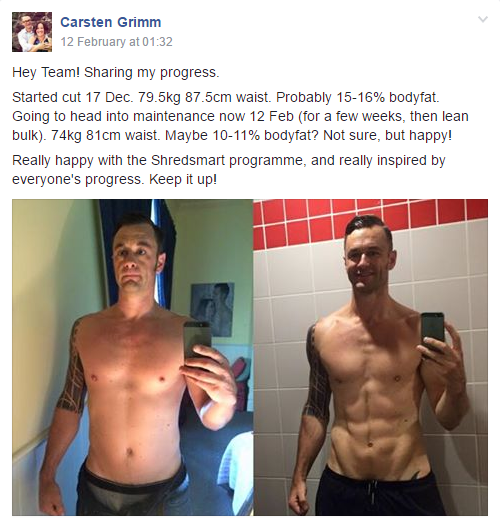
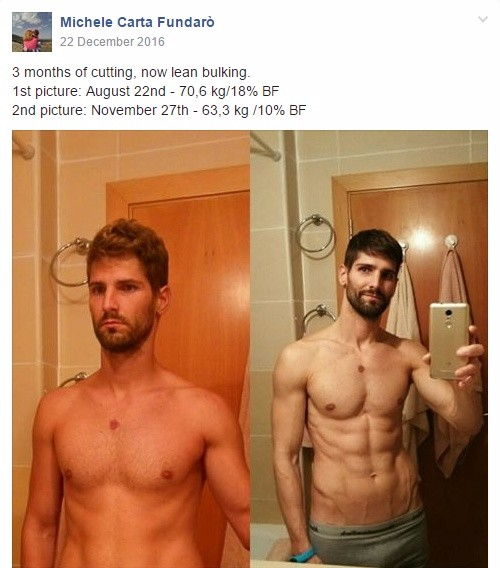

The pictures above are from the ShredSmart Facebook group. You get access to the community after enrolling in the program. These transformations are obviously some of the best that were posted in the group. Not everyone gets such great results so quickly. But impressive transformations are posted fairly often. Join us and see!
Frequently Asked Questions
NOTE: The price varies depending on your country because of VAT.
The authors of this site are not engaged in rendering professional advice or services to the individual reader. Radu Antoniu is not a certified personal trainer or coach and is not accredited by any institution. The ideas, procedures, and suggestions contained within our work are not intended as a substitute for consulting with your physician. All matters regarding your health require medical supervision. The authors shall not be liable or responsible for any loss or damage allegedly arising from any information or suggestions within this website. You, as a reader of this website, are totally and completely responsible for your own health and healthcare.
Your results may vary. Testimonials and examples used are exceptional results and are not intended to guarantee, promise, represent and/or assure that anyone will achieve the same or similar results.
By joining ShredSmart, you will receive updates or promotional messages from us via email. The email address you use to sign up to this site will be passed to MailChimp, our marketing automation platform and email marketing service. You acknowledge that the information you provide will be transferred to MailChimp for processing in accordance with their Privacy Policy and Terms.
